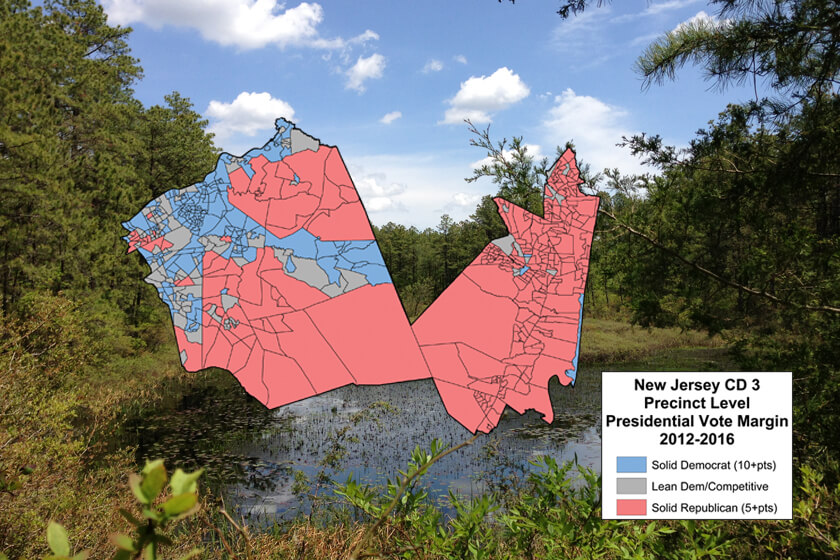West Long Branch, NJ – Republican Rep. Tom MacArthur continues to face a tough challenge from former national security adviser Andy Kim in the race for New Jersey’s 3rd Congressional District. There hasn’t been a lot of change in the state of the race since August according to the Monmouth University Poll, with the Democrat holding a statistically insignificant lead among likely voters. The poll finds that views of the incumbent have become more negative since the summer, as attacks on MacArthur as being beholden to special interests seem to have had an impact. While the partisan gap in voter enthusiasm has narrowed, Pres. Donald Trump remains more of a motivating force among Democrats than among Republicans in this district.
Kim currently holds a statistically insignificant 48% to 46% edge over MacArthur among likely voters using Monmouth’s standard midterm turnout model. Another 2% support a third party candidate and 3% are undecided. The race stands at 50% for Kim and 44% for MacArthur using a model that incorporates a turnout surge in Democratic precincts. A model projecting lower overall turnout shows Kim with a 49% to 46% lead over MacArthur. These results are basically unchanged from Monmouth’s August poll. At that time, Kim had 45% support and MacArthur had 44% support in the standard model. Kim led 46% to 43% in the Democratic surge model and 47% to 44% the low turnout model. All leads in the current likely voter models are within the poll’s margin of error.
NJ-03 encompasses two very distinct geographic areas. The eastern Ocean County section, which is located mainly in the New York media market, is MacArthur’s base. He leads in this segment of the district by 60% to 34%, which is up from his 53% to 36% Ocean County lead in August. The western, Burlington County section located in the Philadelphia media market is more Democratic. Kim leads in this segment of the district by 59% to 36%, which is up from his 53% to 36% Burlington County lead in August. In MacArthur’s prior two elections, he won Ocean County by 25 points in 2014 and 38 points in 2016, similar to his 26 point advantage in the current poll. However, the Republican was also competitive in the Burlington County part of the district, drawing nearly even in 2014 and actually winning by 7 points in 2016. These past results are a far cry from the 23 point deficit he currently has there in Monmouth’s poll.
“This race continues to be a tale of two districts. Right now the Democratic half of the district is running well ahead of past performance. The question is whether enough Trump supporters in the Republican portion will come out to offset it,” said Patrick Murray, director of the independent Monmouth University Polling Institute.
Currently, 77% of likely voters have a lot of interest in the race. This is up from 71% in August, but the Democratic advantage on this measure has narrowed. Two months ago, 83% of Democrats and 70% of Republicans had a lot of interest in the race. Today 79% of Democrats and 75% of Republicans express a high level of interest.
Donald Trump’s current job rating in the district is 49% approve and 49% disapprove. This is a slight uptick from his 47% approve and 50% disapprove rating two months ago. Overall, 74% say that the president is a very important factor in their House vote. However, Trump opponents (84%) continue to be more likely than Trump supporters (74%) to feel this way, which is slightly wider than the opponent (81%) versus supporter (76%) gap in August. Currently, 37% of voters say MacArthur has been too supportive of the president, which is up from 31% who felt that way in August.
“The partisan enthusiasm gap has leveled off and the president maintains an evenly divided job rating. But Trump remains more of a motivating factor for his opponents than for his supporters in this particular race,” said Murray.
The Monmouth University Poll also finds that opinion of MacArthur has grown more negative while opinion of Kim has remained stable as more voters have formed an opinion of the challenger. Currently, 35% of NJ-03 likely voters have a favorable view of the incumbent and a similar 34% have an unfavorable view, with 31% having no opinion. In August, MacArthur had a net +10 positive rating of 35% favorable and 25% unfavorable, with 40% offering no opinion. Kim currently gets a 38% favorable and 28% unfavorable rating, with 34% having no opinion. Both his positive and negative ratings have grown, but the net +10 rating Kim gets now is identical to the +10 rating he had in August when he stood at 27% favorable and 17% unfavorable, with 57% having no opinion.
The challenger has been attacking the incumbent as being beholden to special interests. The poll suggests these attacks might be having an impact. Nearly half (47%) of NJ-03 voters say MacArthur does more to represent special interests while only 28% say he does more to represent average residents in his district. The opposite perception holds for the challenger. Nearly half (48%) think Kim will do more to represent average residents if he is elected, compared with 30% who feel he will do more to represent special interests.
The top voter concern, among six asked about in the poll, is health care (31%). This is followed by immigration (20%), taxes (19%), gun control (10%), jobs (8%), and abortion (7%). Kim now has a clear advantage as the candidate who voters trust more to keep health care affordable – 44% choose Kim compared with 28% who trust MacArthur more on this issue. In August voters were split on their preference for handling health care, with 32% choosing Kim and 31% choosing MacArthur.
Voters are divided on who they trust more to handle tax policy – 36% choose Kim and 32% choose MacArthur. MacArthur was the only member of New Jersey’s delegation to vote in favor of the tax reform bill passed by Congress last year. The legislation is unpopular in his home district, registering 40% approval and 51% disapproval among likely NJ-03 voters.
NJ-03 likely voters’ preference for party control of Congress has swung slightly toward the Democrats. Currently, 43% prefer to see Democratic control and 40% prefer to see Republican control. In August, 42% preferred Republican control and 39% preferred Democratic control.
New Jersey’s 3rd is considered a “pivot” district, having voted for Barack Obama for president in 2012 (by 5 points) and for Trump in 2016 (by 6 points). MacArthur won an open seat here by 10 points in 2014 and then won re-election by 20 points in 2016.
The Monmouth University Poll was conducted by telephone from October 18 to 22, 2018 with 363 likely voters in New Jersey’s 3rd Congressional District. The question results in this release have a margin of error of +/- 5.2 percentage points. The error of the difference between the two candidates’ vote share (i.e. the “lead”) is +/-7.3 percentage points. The poll was conducted by the Monmouth University Polling Institute in West Long Branch, NJ.
QUESTIONS AND RESULTS
(* Some columns may not add to 100% due to rounding.)
1/2. If the election for U.S. House of Representatives in your district was today, would you vote for Tom MacArthur the Republican or Andy Kim the Democrat, or some other candidate? [IF UNDECIDED: If you had to vote for one of the following at this moment, do you lean more toward Tom MacArthur or more toward Andy Kim?] [NAMES WERE ROTATED]
| Likely Voters with leaners |
Oct. 2018 |
Aug. 2018 | ||||
|
Standard | Democratic “Surge” | Low Turnout | Standard Midterm | Democratic “Surge” |
Low | |
| Tom MacArthur | 46% | 44% | 46% | 44% | 43% | 44% |
| Andy Kim | 48% | 50% | 49% | 45% | 46% | 47% |
| Other | 2% | 2% | 2% | 3% | 3% | 2% |
| (VOL) Undecided | 3% | 4% | 3% | 9% | 8% | 7% |
| (n) | (363) | (363) | (363) | (300) | (300) | (300) |
[QUESTIONS 3 & 4 WERE ROTATED]
3. Is your general impression of Tom MacArthur favorable or unfavorable, or do you have no opinion of him?
| Likely Voter Standard | Oct. 2018 | Aug. 2018 |
| Favorable | 35% | 35% |
| Unfavorable | 34% | 25% |
| No opinion | 31% | 40% |
| (n) | (363) | (300) |
4. Is your general impression of Andy Kim favorable or unfavorable, or do you have no opinion of him?
| Likely Voter Standard | Oct. 2018 | Aug. 2018 |
| Favorable | 38% | 27% |
| Unfavorable | 28% | 17% |
| No opinion | 34% | 57% |
| (n) | (363) | (300) |
5. How much interest do you have in the upcoming election for House of Representatives – a lot of interest, a little interest, or not much interest at all?
| Likely Voter Standard | Oct. 2018 | Aug. 2018 |
| A lot | 77% | 71% |
| A little | 17% | 24% |
| Not much at all | 6% | 4% |
| (VOL) Don’t Know | 1% | 0% |
| (n) | (363) | (300) |
6. Have you been following the campaign in your congressional district very closely, somewhat closely, or not too closely?
| Likely Voter Standard | Oct. 2018 | Aug. 2018 |
| Very closely | 34% | 24% |
| Somewhat closely | 45% | 41% |
| Not too closely | 22% | 35% |
| (VOL) Don’t Know | 0% | 0% |
| (n) | (363) | (300) |
7. Do you approve or disapprove of the job Donald Trump is doing as president? [Do you (approve/disapprove) strongly or somewhat?]
| Likely Voter Standard | Oct. 2018 | Aug. 2018 |
| Strongly approve | 35% | 36% |
| Somewhat approve | 14% | 11% |
| Somewhat disapprove | 7% | 6% |
| Strongly disapprove | 42% | 44% |
| (VOL) Don’t know | 2% | 3% |
| (n) | (363) | (300) |
8. On most issues would you say you support or oppose what President Trump is doing?
| Likely Voter Standard | Oct. 2018 | Aug. 2018 |
| Support | 47% | 43% |
| Oppose | 47% | 49% |
| (VOL) Depends/both | 6% | 6% |
| (VOL) Don’t know | 0% | 2% |
| (n) | (363) | (300) |
9. How important is it for you to cast a vote for Congress that shows your [support of/opposition to] President Trump – very important, somewhat important, not too important, or not at all important?
| Likely Voter Standard | Oct. 2018 | Aug. 2018 |
| Very important | 74% | 73% |
| Somewhat important | 14% | 12% |
| Not too important | 2% | 3% |
| Not at all important | 3% | 4% |
| (VOL) Don’t know | 6% | 8% |
| (n) | (363) | (300) |
10. Would you rather see the Republicans or the Democrats in control of Congress, or doesn’t this matter to you?
| Likely Voter Standard | Oct. 2018 | Aug. 2018 |
| Republicans | 40% | 42% |
| Democrats | 43% | 39% |
| Does not matter | 16% | 17% |
| (VOL) Don’t know | 1% | 2% |
| (n) | (363) | (300) |
[QUESTIONS 11 & 12 WERE ROTATED]
11. Do you think Tom MacArthur does more to represent special interests or does more to represent average residents in the district? [CHOICES WERE ROTATED]
| Likely Voter Standard | Oct. 2018 |
| Represent special interests | 47% |
| Represent average residents | 28% |
| (VOL) Both equally | 5% |
| (VOL) Don’t know | 20% |
| (n) | (363) |
12. If he is elected, do you think Andy Kim will do more to represent special interests or will do more to represent average residents in the district? [CHOICES WERE ROTATED]
| Likely Voter Standard | Oct. 2018 |
| Represent special interests | 30% |
| Represent average residents | 48% |
| (VOL) Both equally | 2% |
| (VOL) Don’t know | 19% |
| (n) | (363) |
13. Please tell me which one of the following policy issues is most important to you in your vote choice for Congress? [ITEMS WERE ROTATED]
| Likely Voter Standard | Oct. 2018 |
| Immigration policy | 20% |
| Health care policy | 31% |
| Gun control policy | 10% |
| Abortion policy | 7% |
| Tax policy | 19% |
| Job creation policy | 8% |
| (VOL) Other | 2% |
| (VOL) Don’t know | 3% |
| (n) | (363) |
[QUESTIONS 14A & 14B WERE ROTATED]
14A. Who do you trust more to work to keep health care affordable – Tom MacArthur or Andy Kim, or do you trust both equally? [NAMES WERE ROTATED]
| Likely Voter Standard | Oct. 2018 | Aug. 2018 |
| Tom MacArthur | 28% | 31% |
| Andy Kim | 44% | 32% |
| Both equally | 17% | 14% |
| (VOL) Neither one | 6% | 7% |
| (VOL) Don’t know | 5% | 15% |
| (n) | (363) | (300) |
14B. Who do you trust more to handle tax policy – Tom MacArthur or Andy Kim, or do you trust both equally? [NAMES WERE ROTATED]
| Likely Voter Standard | Oct. 2018 |
| Tom MacArthur | 32% |
| Andy Kim | 36% |
| Both equally | 18% |
| (VOL) Neither one | 6% |
| (VOL) Don’t know | 8% |
| (n) | (363) |
15. Do you approve or disapprove of the tax reform plan passed by Congress last year? [Do you (approve/disapprove) strongly or somewhat?]
| Likely Voter Standard | Oct. 2018 | Aug. 2018 |
| Strongly approve | 23% | 24% |
| Somewhat approve | 17% | 17% |
| Somewhat disapprove | 15% | 12% |
| Strongly disapprove | 36% | 36% |
| (VOL) Don’t know | 9% | 11% |
| (n) | (363) | (300) |
16. Has Tom MacArthur been too supportive of Donald Trump, not supportive enough, or has he given the right amount of support to Trump?
| Likely Voter Standard | Oct. 2018 | Aug. 2018 |
| Too supportive | 37% | 31% |
| Not supportive enough | 10% | 8% |
| Right amount of support | 35% | 34% |
| (VOL) Don’t know | 18% | 28% |
| (n) | (363) | (300) |
METHODOLOGY
The Monmouth University Poll was sponsored and conducted by the Monmouth University Polling Institute from October 18 to 22, 2018 with a random sample of 363 likely voters in New Jersey’s 3rd Congressional District, drawn from a list of registered voters who voted in at least one of the last four general or primary elections or have registered to vote since January 2016. This includes 223 contacted by a live interviewer on a landline telephone and 140 contacted by a live interviewer on a cell phone in English. Monmouth is responsible for all aspects of the survey design, data weighting and analysis. Final sample is weighted for region, party registration, age, gender, education and race based on state voter registration list and U.S. Census information. Data collection support provided by Braun Research (field) and L2 (voter sample). For results based on this sample, one can say with 95% confidence that the error attributable to sampling has a maximum margin of plus or minus 5.2 percentage points (unadjusted for sample design). Sampling error can be larger for sub-groups (see table below). In addition to sampling error, one should bear in mind that question wording and practical difficulties in conducting surveys can introduce error or bias into the findings of opinion polls.
| DEMOGRAPHICS (weighted) |
|
Party Registration |
| 36% Republican |
| 36% Democrat |
| 28% Neither |
|
Self-Reported Party ID |
| 33% Republican |
| 36% Independent |
| 31% Democrat |
| 45% Male |
| 55% Female |
| 11% 18-34 |
| 16% 35-49 |
| 34% 50-64 |
| 39% 65+ |
| 83% White, non-Hispanic |
| 17% Other |
| 61% No college degree |
| 39% 4-year college degree |
| 57% Burlington County |
| 43% Ocean County |
Click on pdf file link below for full methodology and results by key demographic groups.




